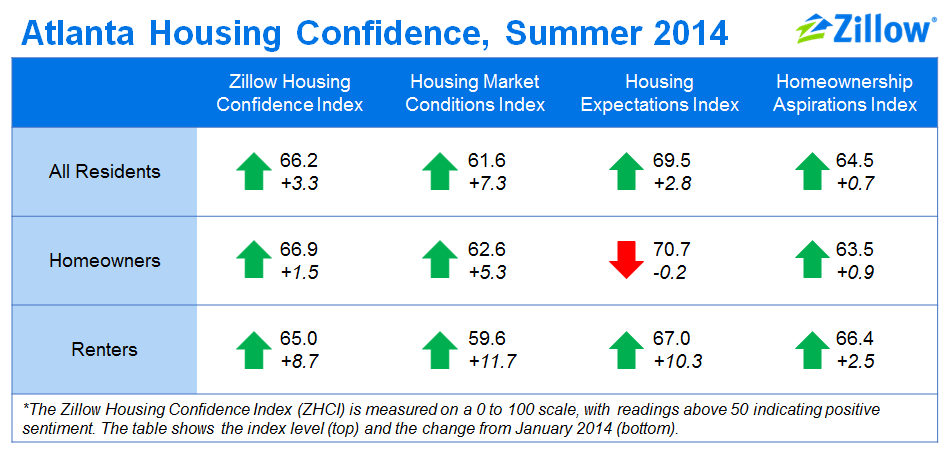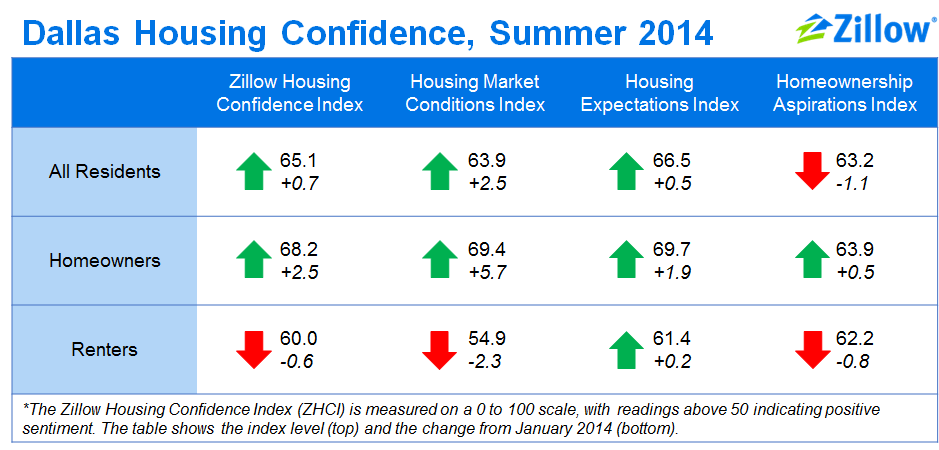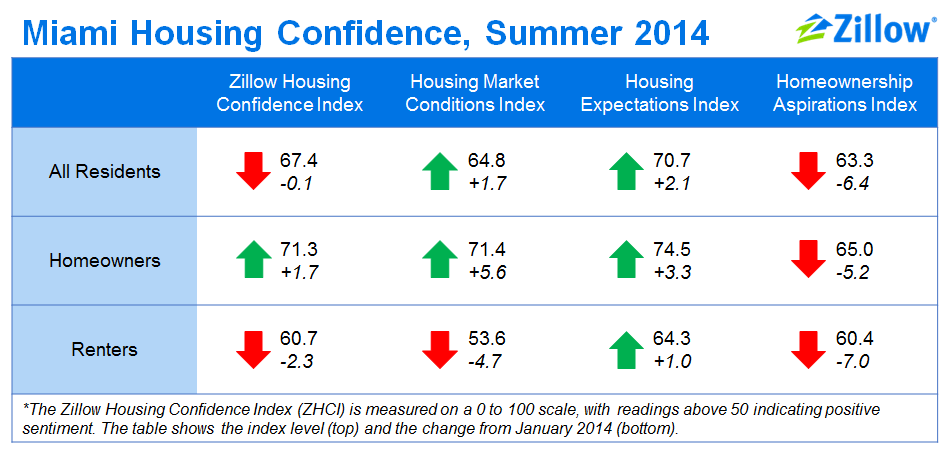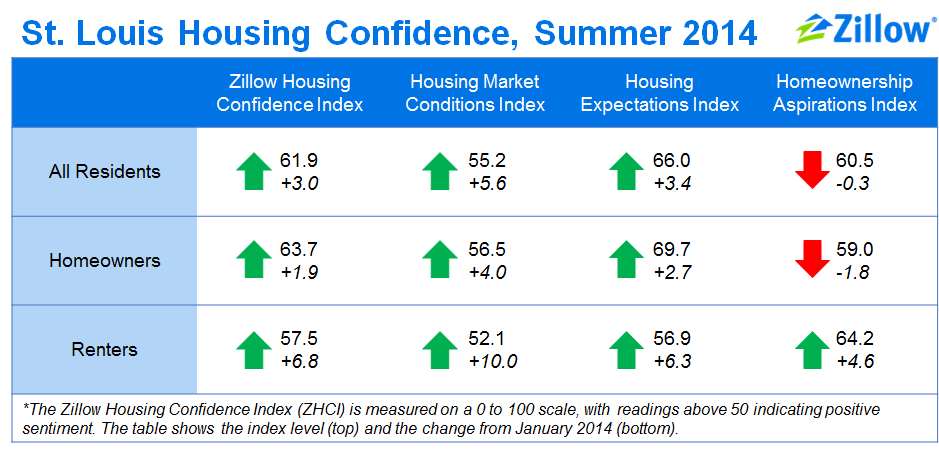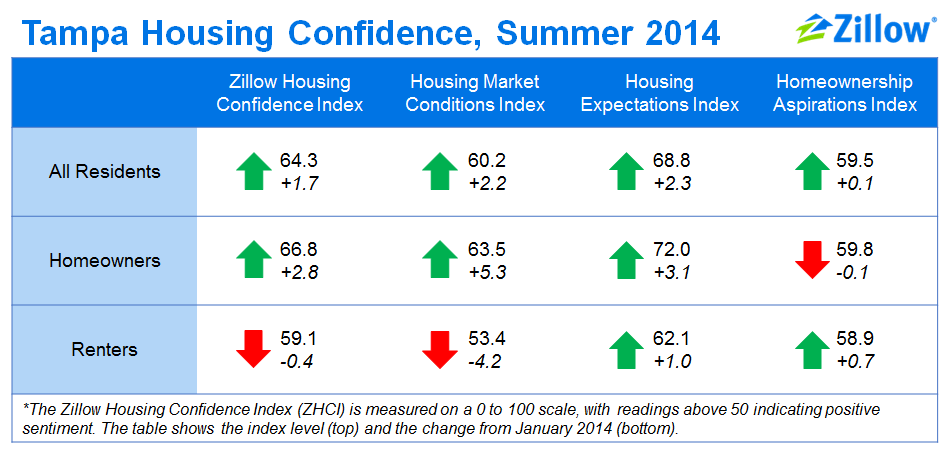Part 1, focused on the Northeast, can be found here.
Part 3, focused on the Midwest, can be found here.
Part 4, focused on the West, can be found here.
Housing market confidence has improved in the South. Confidence among owners is, on aggregate, below confidence among owners in the West and Northeast, but confidence among renters remains higher than elsewhere in the country, according to the most recent Zillow Housing Confidence Index.
The Zillow Housing Confidence Index, sponsored by Zillow and developed and administered by Pulsenomics LLC, offers unique insight into homeowners’ and renters’ intentions and attitudes about the housing market, and provides a gauge of housing market health looking forward. It is based on more than 10,000 interviews in 20 real estate markets.
The ZHCI is measured on a 0 to 100 scale, with readings above 50 indicating positive sentiment. The headline index is comprised of three sub-indices:
- The Housing Market Conditions Index (HMCI), which measures prevailing market trends and buying/selling conditions.
- The Housing Expectations Index (HEI), measuring expected changes in home values, home affordability and the value of homeownership.
- The Homeownership Aspirations Index (HAI), which measures household home-buying plans and attitudes toward the social value of homeownership.
Below is a detailed breakdown of homeowner and renter confidence in the Atlanta, Dallas, Miami, St. Louis and Tampa metros.
Hotlanta!
- Housing market confidence has improved in Atlanta, with confidence moving sharply upward for renters.
- About 17 percent of Atlanta renters said they expect to buy in the next year, which would translate into 280,000 new homeowners.
- Young adults in Atlanta said they are skeptical about the financial returns of homeownership, but are optimistic about its social benefits.
Housing market confidence has increased in the Atlanta metro compared to earlier in the year, with both renters and owners feeling better about the housing market. The sub-index for renters increased much more dramatically than the sub-index for owners. Atlanta registered the largest improvement and highest overall level in renter confidence among all 20 metros surveyed. Renters’ higher confidence was driven both by their improved outlook about current market conditions, and by their strong future expectations about how the market will evolve over the next year.
Survey respondents said they expect home values to increase by about 3.3 percent over the next year in the Atlanta metro area. Zillow’s September 2014 Home Value Forecast projects a 5.2 percent increase over the next year, compared to a 14.7 percent increase over the past year. When asked to estimate how much home values increased over the past year, survey respondents said 3.6 percent, on average. More housing data for the Atlanta metro area are available here.
Three quarters (75 percent) of Atlanta-area renters said they are “confident” or “somewhat confident” they will eventually be able to buy a home, the highest share in the country. Among young adults age 18 to 34 the share is much higher, at 84 percent. Over the next year, 17 percent of renters said they expect to buy a home. If these plans come to fruition, it would translate into about 280,000 new homeowners in the Atlanta metro area.[1] An additional 26 percent of renters said they plan to buy a home one to two years in the future, which would translate into about 360,000 new homeowners between mid-2015 and mid-2016.
Young adults in the Atlanta area are more skeptical than other age groups of the financial returns to housing, but they remain extremely bullish on housing for societal reasons. More than one-third (36 percent) of millennials said they do not think buying a home is the best long-term investment a person can make, compared to about one-quarter (25 percent) of Baby Boomers. However, 77 percent of millennials said they believe owning a home provides a person more personal freedom than renting, compared to 62 percent of Baby Boomers. Similarly, 69 percent said they agreed with the statement that owning a home is necessary to living “the good life” or “the American dream,” compared to 54 percent of Baby Boomers.
Dreary Outlook for Renters in Dallas
- Housing market confidence has increased modestly in Dallas, but confidence for renters and owners has moved in opposite directions.
- About 15 percent of Dallas renters said they expect to buy within the next year, which would translate into about 330,000 new homeowners.
- Racial and ethnic minorities in the Dallas area tend to have more traditional views about the financial and social returns to homeownership.
Housing market confidence has increased slightly in the Dallas metro area, although the sub-indices for renters and homeowners moved in opposite directions. The homeowners’ sub-index rose primarily because of an improved outlook about the current state of market conditions, while the renters’ sub-index fell because of a deteriorating view of current market conditions and diminished homeownership aspirations among renters.
Survey respondents said they expect home values to increase by about 3.1 percent over the next year in the Dallas metro area. Zillow’s September 2014 Home Value Forecast projects a 4.4 percent increase over the next year, compared to a 6.1 percent increase over the past year. When asked to estimate how much home values increased over the past year, survey respondents said 3.9 percent, on average. More housing data for the Dallas metro area are available here.
Almost three quarters (73 percent) of Dallas-Fort Worth-area renters said they are “confident” or “somewhat confident” they will eventually be able to buy a home. Among young adults age 18 to 34 the share is much higher, at 85 percent. Over the next year, 15 percent of renters said they expect to buy a home. If these plans come to fruition, it would translate into about 330,000 new homeowners in the Dallas-Fort Worth metro area. An additional 28 percent of renters said they plan to buy a home one to two years in the future, which would translate into about 520,000 new homeowners between mid-2015 and mid-2016.
Racial and ethnic minorities in Dallas tend to have more traditional views on homeownership than whites. For example, 74 percent of blacks, 73 percent of Asians and 70 percent of Hispanics in and around Dallas said they think that owning a home is the best long-term investment a person can make, compared to 59 percent of whites. Similarly, 80 percent of Asians, 76 percent of blacks and 75 percent of Hispanics said they think owning provides a person more freedom than renting, compared to 64 percent of whites.
Renters Feeling the Heat in Miami
- Housing market confidence fell slightly in Miami compared to earlier in the year, driven downward by weakening confidence among renters.
- About 9 percent of Miami renters said they expect to buy within the next year, which would translate into 170,000 new homeowners.
- Miami millennials are more optimistic about the benefits of homeownership than Baby Boomers.
Housing market confidence decreased slightly in the Miami metro area, driven mostly by lower homeownership aspirations. The sub-indices for renters and homeowners moved in opposite directions: The homeowners’ sub-index improved largely thanks to an improved outlook about the current state of market conditions, while the renters’ sub-index fell because of deteriorating homeownership aspirations. Miami renters registered the largest drop in the Homeownership Aspirations Index among all 20 metros surveyed.
Survey respondents said they expect home values to increase by about 3.4 percent over the next year in the Miami metro area. Zillow’s September 2014 Home Value Forecast projects a 2.5 percent increase over the next year compared to a 15.7 percent increase over the past year. When asked to estimate how much home values increased over the past year, survey respondents said 4.7 percent, on average. More housing data for the Miami metro area are available here.
Almost three quarters (72 percent) of Miami-area renters said they are “confident” or “somewhat confident” that they will eventually be able to buy a home. Among young adults age 18 to 34, the share is much higher, at 91 percent. Over the next year, 9 percent of renters said they expect to buy a home. If these plans come to fruition, it would translate into about 170,000 new homeowners in the Miami metro area. An additional 25 percent of renters said they plan to buy a home one to two years in the future, which would translate into about 440,000 new homeowners between mid-2015 and mid-2016.
Young adults in Miami are extremely optimistic about the financial and social returns to homeownership. For example, 78 percent of millennials age 18 to 34 said they believe that buying a home is the best long-term investment a person can make, compared to 71 percent of Baby Boomers age 50 to 64. Similarly, 82 percent of Miami millennials said they agree that owning a home is necessary to living “the good life” and achieving “the American dream,” compared to 58 percent of Baby Boomers. When asked whether owning a home is necessary to be a “respected member of society,” more than half (51 percent) of millennials said they agreed, compared to about one-quarter (27 percent) of Baby Boomers.
Renters and Owners Feeling Sunny in St. Louis
- Housing market confidence has improved for both renters and owners in St. Louis.
- About 14 percent of St. Louis renters said they expect to buy within the next year, which would translate into about 100,000 new homeowners.
- Blacks in St. Louis tend to hold more positive views than other racial and ethnic groups about the financial and social returns to homeownership.
Housing market confidence increased in the St. Louis metro. Both the renters’ and homeowners’ sub-indices increased, but confidence improved much more dramatically for renters. The increased confidence among renters’ is the second-largest among all 20 metros surveyed. All renters’ sub-indices improved, but the largest improvement was their upgraded assessment of current market conditions. Homeowners also expressed greater confidence in the current state of the market.
Survey respondents said they expect home values to increase by about 1.6 percent over the next year in the St. Louis metro area. Zillow’s September 2014 Home Value Forecast projects a 2 percent increase over the next year compared to a 1.6 percent increase over the past year. When asked to estimate how much home values increased over the past year, survey respondents said 1.2 percent, on average. More housing data for the St. Louis metro area are available here.
Three quarters (75 percent) of St. Louis-area renters said they are “confident” or “somewhat confident” they will eventually be able to buy a home, the highest overall share in the country. Among young adults age 18 to 34, the share is much higher, at 85 percent. Over the next year, 14 percent of renters said they expect to buy a home. If these plans come to fruition, it would translate into about 100,000 new homeowners in the St. Louis metro area. An additional 39 percent of renters said they plan to buy a home one to two years in the future, which would translate into about 240,000 new homeowners between mid-2015 and mid-2016.
Blacks tend to hold more traditional views on homeownership than other racial and ethnic groups in St. Louis. For instance, 59 percent of blacks said they believe that buying a home is the best long-term investment a person can make, compared to 56 percent of whites, 45 percent of Asians and 37 percent of Hispanics. Similarly, 71 percent of blacks in the St. Louis area said they agreed that owning a home is necessary to live “the good life” and “the American dream,” compared to 63 percent of Asians, 58 percent of whites and 48 percent of Hispanics.
Tepid Confidence in Tampa
- Housing market confidence rose modestly in Tampa, with the sub-indices for renters and owners moving in opposite directions.
- About 14 percent of Tampa renters said they expect to buy within the next year, which would translate into about 120,000 new homeowners.
- Blacks and Hispanics in the Tampa area tend to have more positive views than whites and Asians about the financial and social benefits of homeownership.
Housing market confidence increased modestly in the Tampa metro area compared to earlier in the year, although the sub-indices for renters and homeowners moved in opposite directions. The homeowners’ sub-index improved, primarily driven by an improved outlook about the current state of market conditions; while the renters’ sub-index fell, mainly because of a deteriorating view of the same conditions.
Survey respondents said they expect home values to increase by about 3.4 percent over the next year in the Tampa metro area. Zillow’s September 2014 Home Value Forecast projects a 3.2 percent increase over the next year, compared to an 11.8 percent increase over the past year. When asked to estimate how much home values increased over the past year, survey respondents said 3.5 percent, on average. More housing data for the Tampa metro area are available here.
More than two-thirds (70 percent) of Tampa-area renters said they are “confident” or “somewhat confident” they will eventually be able to buy a home. Among young adults age 18 to 34, the share is much higher, at 87 percent. Over the next year, 14 percent of renters said they expect to buy a home. If these plans come to fruition, it would translate into about 120,000 new homeowners in the Tampa metro area. An additional 27 percent of renters said they plan to buy a home one to two years in the future, which would translate into about 200,000 new homeowners between mid-2015 and mid-2016.
Blacks and Hispanics in the Tampa area tend to have more traditional views on homeownership than whites and Asians. For example, 71 percent of Hispanics and 70 percent of blacks said they think buying a home is the best long-term investment a person can make, compared to 61 percent of whites and 44 percent of Asians. Similarly, 79 percent of blacks and 70 percent of Hispanics said they believe that owning a home is necessary to living “the good life” and “the American dream,” compared to 56 percent of whites and 34 percent of Asians. When asked whether owning a home is necessary to be a respected member of society, 45 percent of blacks and 38 percent of Hispanics said they agreed, compared to 31 percent of whites and 30 percent of Asians.
[1] Estimate calculated by applying home purchase expectations from the Zillow Housing Confidence Survey to household tenure estimates from the 2012 American Community Survey. Figures are for individuals, not households.
Alex Hubbard assisted with the research and drafting of this brief.
